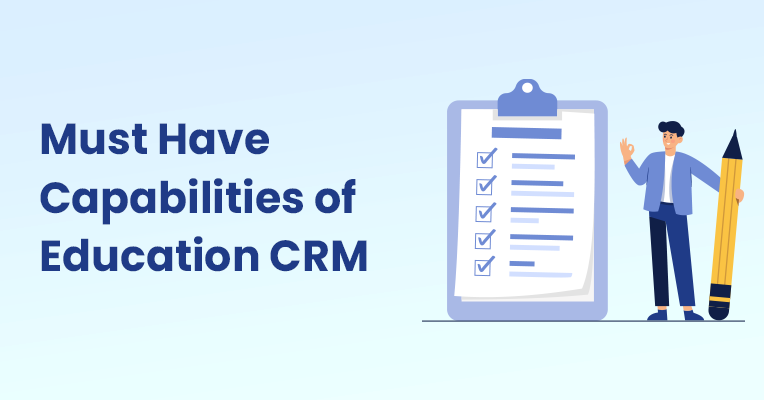Education CRM (Customer Relationship Management) systems play a crucial role in helping educational institutions effectively manage their interactions and relationships with students, prospects, and alumni. In today’s rapidly evolving and technology-driven world, it is imperative for educational institutions to embrace an efficient CRM solution that streamlines processes, enhances communication, and elevates the student experience.
In this insightful blog post, we will delve into the must-have capabilities of an Education CRM system, empowering institutions to achieve their objectives and maintain a competitive edge. From comprehensive student data management to automated marketing campaigns, we will explore the essential features that every Education CRM should possess. Whether you are in the process of implementing a new CRM solution or considering an upgrade to your existing system, this blog will provide valuable insights on what to look for in an Education CRM. Join us as we uncover the key factors that drive success in education CRM and discover how Meritto (formerly NoPaperForms) can support your institution in harnessing the full potential of an Education CRM. Get ready to revolutionize your institution’s relationship management and elevate the student experience to new heights.
What is an Education CRM?
An Education CRM, or customer relationship management system, is a software tool that is used to manage and streamline the interactions and relationships between educational institutions and their various stakeholders, such as students, parents, and staff. It is used to store and organize data such as student and staff contact information, enrollment and academic records, and communication history. It also provides tools for automating and streamlining processes such as recruitment, admissions, and communication. Educational organisations can better understand and engage with their stakeholders, and improve the overall efficiency and effectiveness of their operations. It enables them in improving student outcomes and increasing overall satisfaction among students, parents, and staff.
Benefits of Education CRM
Before we go on and discuss the must have capabilities of Education CRM, here are some of its benefits:
- Improved communication and engagement with students and other stakeholders
- Increased efficiency and automation of administrative tasks
- Better data management and reporting capabilities
- Improved ability to track student progress and success
- Enhanced ability to personalise and tailor communications to different groups of students
Must Have Capabilities of Education CRM
A CRM has a variety of capabilities that can help educational institutions manage interactions with students, faculty, and other stakeholders more effectively. Some of the must have capabilities of education CRM are:
- Contact Management: An education CRM can store and manage contact information for students, faculty, and other stakeholders, including contact details, demographic information, and any other relevant information. This allows institutions to easily access and update contact information for all of their stakeholders, which can improve communication and engagement.
- Communication Tools: An education CRM can integrate with various communication tools, such as email, SMS, and social media, to facilitate communication with students and other stakeholders. This allows institutions to easily send out mass communications, such as updates and announcements, as well as personalised messages to specific groups of students or individuals.
- Marketing Automation: Another major must have capabilities of Education CRM is marketing automation. It provides tools to automate and personalize marketing and outreach efforts to students and other stakeholders. This can include features such as automated email campaigns, targeted marketing, and segmentation of student groups based on demographics, academic performance, and other criteria.
- Analytics and Reporting: Tracking and analysing student engagement, success, and other metrics, providing insight into how students are interacting with the institution and how they are performing. This data can be used to inform decisions and improve student outcomes.
- Data Management: One of the most beneficial must have capabilities of Education CRM is tracking and management of student data, including grades, coursework, and other information. This allows institutions to easily access and update student information, such as enrollment status, academic progress, and other data, which can help improve student support and engagement.
- Admissions Management: An Education CRM is also capable of managing the complete admission process of a student from the initial enquiry to enrollment. It can automate the process of lead management, inquiry tracking, and application management. This can help to streamline the entire process and reduce administrative work.
- Candidate/ Student Portal: Education CRM can provide a self-service portal that allows students and other stakeholders to access information, submit requests, and perform tasks without contacting the institution directly. This can help to improve engagement and reduce administrative work.
Final Takeaways
Overall, Education CRM can help educational institutions to manage interactions with students and other stakeholders more effectively, improving communication, streamlining administrative tasks, and providing data and insights that can help to improve student outcomes. Directly helping educational organisations in boosting the admissions and conversion rate! Switch to Meritto’s (formerly NoPaperForms) Education CRM and experience growth like never before! Schedule a demo today to learn more!




